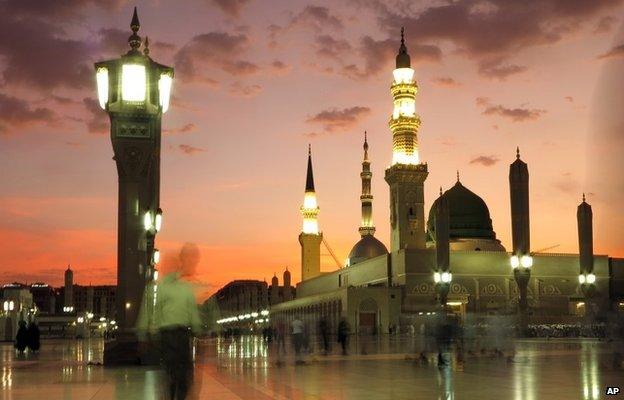Saudi Arabia's religious police 'contains extremists'
- Published

The mutawa enforce strict religious and social restrictions in the conservative Sunni Muslim kingdom
The head of Saudi Arabia's religious police - the "mutawa" - has admitted the force contains some extremists, and has promised to remove them.
Sheikh Abdul Latif al-Sheikh was quoted in the Saudi newspaper, Okaz, as saying that he would "eliminate" those he described as "advocates of sedition".
He said calls for jihad were "void".
His comments came after a royal decree on Monday specified jail terms of up to 20 years for Saudis who fight in a conflict abroad.
It also said Saudis who joined, endorsed or gave moral or material aid to "extremist religious and ideological groups, or those classified as terrorist organisations", whether inside or outside the country, faced prison.
The interior ministry estimates that around 1,200 Saudis have travelled to Syria to fight since the uprising began in March 2011.
Many of them have joined Islamist rebel groups that the Saudi government reportedly supports with money and weapons.
However, it fears that Saudi jihadists could switch their attention to their homeland, as happened when many returned from the conflicts in Afghanistan and Bosnia in the 1980s and 1990s.
Religious police officers - who roam the streets enforcing strict segregation of the sexes, an absolute prohibition of the sale and consumption of alcohol, a ban on women driving and many other social restrictions - are frequently accused of abusing their powers.
In 2002, journalists and witnesses said religious police officers had hampered efforts to rescue 15 girls who died in a fire at a school in Mecca. They were accused of preventing girls from leaving the school without their headscarves and of stopping male rescuers from entering. However, an inquiry absolved the officers of responsibility for the deaths.
More recently, officers were accused of causing a fatal car crash when they chased a man who had refused to turn his radio down.
Counter-terrorism law
In a separate development on Tuesday, Amnesty International warned, external that a new counter-terrorism law that took effect on Saturday would "serve as a further tool to suppress peaceful political dissent" and provide a "recipe for systematic torture".
The Law for the Crimes of Terrorism and its Financing used an overly vague definition of terrorism, giving the interior ministry broad new powers, and legalised a range of ongoing human rights violations against detainees, the human rights group said.
Among the offences labelled terrorism are any acts directly or indirectly aimed at "disturbing the public order of the state", "destabilising the security of society, or the stability of the state", "endangering its national unity", "revoking the basic law of governance or any of its articles", or "harming the reputation of the state or its standing".
Similar charges were used against almost all Saudi human rights defenders and civil society activists arrested and prosecuted in 2013.
Amnesty said the new law also granted the interior ministry wide powers with little or no judicial oversight, including the ability to order searches, seizures, arrests and detention of suspects.
"Legalising prolonged incommunicado detention and blocking timely judicial challenges to detention is a recipe for systematic torture and other ill-treatment in custody," said Amnesty's Middle East and North Africa deputy director, Said Boumedouha.
- Published21 November 2013
- Published15 May 2013
- Published18 October 2012
- Published14 July 2012